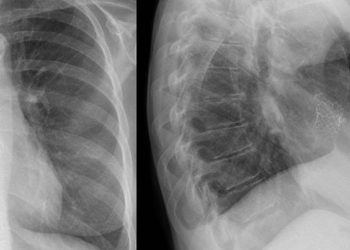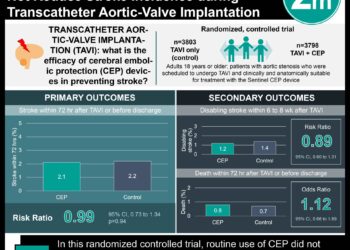Post-intensive care syndrome risk in out-of-hospital cardiac arrest patients
1. Approximately half of patients with out-of-hospital cardiac arrest (OHCA) have signs of post-intensive care syndrome (PICS) at 3 and 12 months after ICU admission, including impairments to their physical, cognitive, and psychological well-being.
2. Risk factors for PICS for OHCA patients include increased length of stay in ICU, illness severity, intubation, poor functionality at discharge, and loss of work.
Evidence Rating Level: 2 (Good)
Post-intensive care syndrome (PICS) refers to the physical, cognitive, and psychological detriments that patients may face long-term after leaving the ICU. In particular, patients who suffer from out-of-hospital cardiac arrest (OHCA) have been associated with long-term negative impacts in these domains. Therefore, this study aimed to assess the prevalence and risk factors for PICS amongst adult OHCA survivors. This cohort study was based at a single centre in Switzerland, and conducted follow-up with OHCA patients 3 months and 12 months after admission to ICU. The level of physical impairment was measured using the EuroQol questionnaire (EQ-5D-3L), the cognitive domain was measured using the Cerebral Performance Category (CPC) and modified Rankin Scale (mRS), and the psychological domain was measured using the Hospital Anxiety and Depression Scale (HADS) and Impact of Event Scale-Revised (IES-R). The study population consisted of 139 patients at the 3-month follow-up and 110 patients at the 12-month follow-up, with a median age of 62.8 years, median ICU stay duration of 4 days, and median hospital stay of 13 days. The results showed that at 3 months follow-up, 49.6% of patients showed signs of PICS, with 36.7% demonstrating physical effects, 25.2% demonstrating cognitive effects, and 12.9% demonstrating psychological effects. Risk factors included intubation (OR 2.21, 95% CI 1.02-4.78, p = 0.043), length of ICU stay in days (OR 1.11, 95% CI 1.01-1.21, p = 0.022), work loss during period of follow-up (OR 14.53, 95% CI 1.8-117.56, p = 0.012), and poor functionality at discharge, as measured by mRS (OR 4.35, 95% CI 1.7-11.1, p = 0.002) and CPC (OR 3.39, 95% CI 1.46-7.88, p = 0.005). At 12 months follow-up, 47.3% demonstrated signs of PICS, with 36.7% demonstrating signs in the physical domain, 22.2% in the cognitive domain, and 12.7% in the psychological domain. Risk factors included initial illness severity as measured by the APACHE II score (OR 1.08, 95% CI 1.02-1.14, p = 0.008) and functionality at discharge, with lower risk of PICS found amongst patients not needing rehabilitation (OR 0.31, 95% CI 0.12-0.82, p = 0.019). Overall, this study showed that PICS affects approximately half of OHCA patients as far as 1 year after their admission to ICU, demonstrating the importance of screening and identifying patients at risk for PICS, and connecting them with relevant resources to support their physical, cognitive, and psychological recovery.
Click to read this study in PLOS ONE
Image: PD
©2022 2 Minute Medicine, Inc. All rights reserved. No works may be reproduced without expressed written consent from 2 Minute Medicine, Inc. Inquire about licensing here. No article should be construed as medical advice and is not intended as such by the authors or by 2 Minute Medicine, Inc.







